六年级英语过去式句子练习
小学英语六年级过去式作文六句
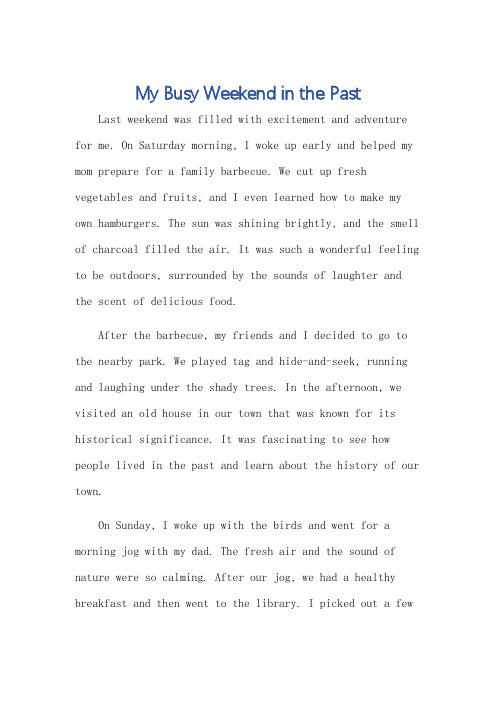
My Busy Weekend in the PastLast weekend was filled with excitement and adventure for me. On Saturday morning, I woke up early and helped my mom prepare for a family barbecue. We cut up fresh vegetables and fruits, and I even learned how to make my own hamburgers. The sun was shining brightly, and the smell of charcoal filled the air. It was such a wonderful feeling to be outdoors, surrounded by the sounds of laughter and the scent of delicious food.After the barbecue, my friends and I decided to go to the nearby park. We played tag and hide-and-seek, running and laughing under the shady trees. In the afternoon, we visited an old house in our town that was known for its historical significance. It was fascinating to see how people lived in the past and learn about the history of our town.On Sunday, I woke up with the birds and went for a morning jog with my dad. The fresh air and the sound of nature were so calming. After our jog, we had a healthy breakfast and then went to the library. I picked out a fewbooks that interested me, and we spent the rest of the day reading and discussing them.That weekend was truly memorable for me. It was aperfect blend of fun, learning, and spending quality time with my family and friends. I am looking forward to more weekends like that in the future.**我忙碌的周末**上周末对我来说充满了兴奋和冒险。
一般过去式(专项训练)教科版(广州)英语六年级下册
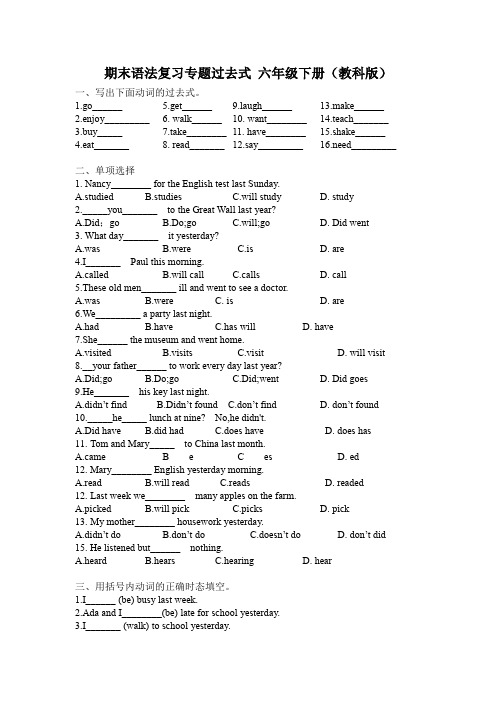
期末语法复习专题过去式六年级下册(教科版)一、写出下面动词的过去式。
1.go______ 5.get______ugh______13.make______2.enjoy_________ 6. walk______10. want________14.teach_______3.buy_____7.take________11. have________15.shake______4.eat_______8. read_______12.say_________16.need_________二、单项选择1. Nancy________ for the English test last Sunday.A.studiedB.studiesC.will studyD. study2._____you_______ to the Great Wall last year?A.Did;goB.Do;goC.will;goD. Did went3. What day_______ it yesterday?A.wasB.wereC.isD. are4.I_______ Paul this morning.A.calledB.will callC.callsD. call5.These old men_______ ill and went to see a doctor.A.wasB.wereC. isD. are6.We_________ a party last night.A.hadB.haveC.has willD. have7.She______ the museum and went home.A.visitedB.visitsC.visitD. will visit8.__your father______ to work every day last year?A.Did;goB.Do;goC.Did;wentD. Did goes9.He_______ his key last night.A.didn’t findB.Didn’t foundC.don’t findD. don’t found10._____he_____ lunch at nine?No,he didn't.A.Did haveB.did hadC.does haveD. does has11.Tom and Mary_____ to China last month.A.came B e C es D. ed12. Mary________ English yesterday morning.A.readB.will readC.readsD. readedst week we________ many apples on the farm.A.pickedB.will pickC.picksD. pick13.My mother________ housework yesterday.A.didn’t doB.don’t doC.doesn’t doD. don’t did15. He listened but______ nothing.A.heardB.hearsC.hearingD. hear三、用括号内动词的正确时态填空。
英语过去式六年级练习题
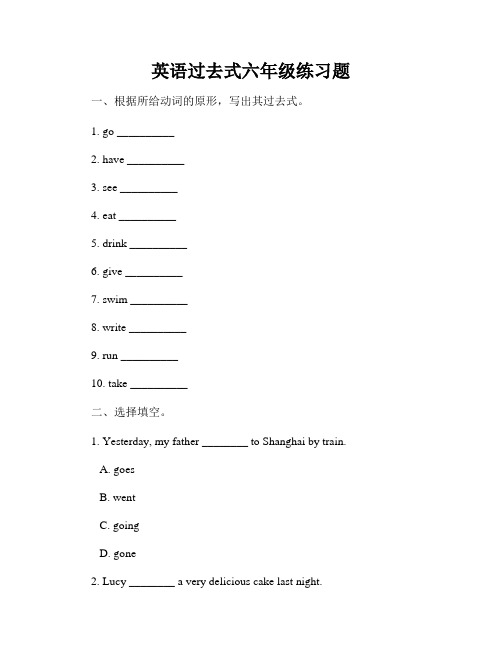
英语过去式六年级练习题一、根据所给动词的原形,写出其过去式。
1. go __________2. have __________3. see __________4. eat __________5. drink __________6. give __________7. swim __________8. write __________9. run __________10. take __________二、选择填空。
1. Yesterday, my father ________ to Shanghai by train.A. goesB. wentC. goingD. gone2. Lucy ________ a very delicious cake last night.A. makeB. makesC. madeD. making3. We ________ to the zoo on Sunday.A. goesB. wentC. goingD. gone4. They ________ basketball after school yesterday.A. playB. playsC. playedD. playing5. My sister ________ a new dress for the party.A. wearB. wearsC. woreD. wearing6. Tom ________ a funny movie with his friends yesterday.A. watchB. watchesC. watchedD. watching7. The students ________ their homework after school.A. doB. doesC. didD. doing8. Jack ________ his bike on the way to school this morning.A. rodeB. rideC. ridesD. riding9. Last week, we ________ a picnic in the park.A. haveB. hasC. hadD. having10. Sarah ________ her grandfather on his birthday.A. visitB. visitsC. visitedD. visiting三、用所给动词的适当形式填空。
小学六年级英语语法一般过去时态讲解及习题
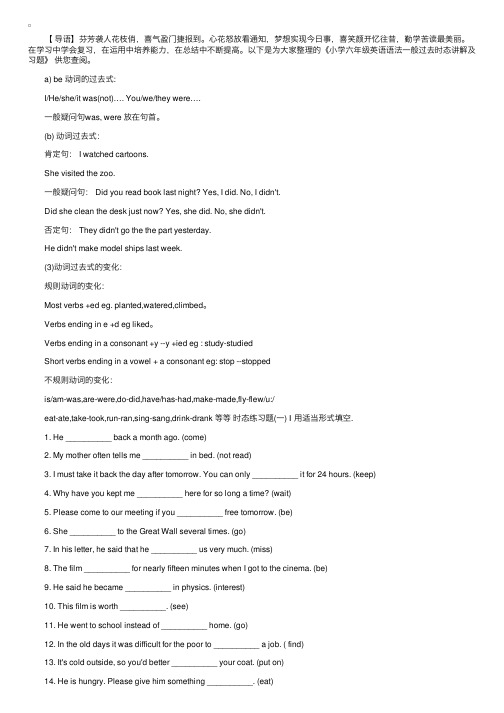
【导语】芬芳袭⼈花枝俏,喜⽓盈门捷报到。
⼼花怒放看通知,梦想实现今⽇事,喜笑颜开忆往昔,勤学苦读最美丽。
在学习中学会复习,在运⽤中培养能⼒,在总结中不断提⾼。
以下是为⼤家整理的《⼩学六年级英语语法⼀般过去时态讲解及习题》供您查阅。
a) be 动词的过去式: I/He/she/it was(not)…. You/we/they were…. ⼀般疑问句was, were 放在句⾸。
(b) 动词过去式: 肯定句: I watched cartoons. She visited the zoo. ⼀般疑问句: Did you read book last night? Yes, I did. No, I didn't. Did she clean the desk just now? Yes, she did. No, she didn't. 否定句: They didn't go the the part yesterday. He didn't make model ships last week. (3)动词过去式的变化: 规则动词的变化: Most verbs +ed eg. planted,watered,climbed。
Verbs ending in e +d eg liked。
Verbs ending in a consonant +y --y +ied eg : study-studied Short verbs ending in a vowel + a consonant eg: stop --stopped 不规则动词的变化: is/am-was,are-were,do-did,have/has-had,make-made,fly-flew/u:/ eat-ate,take-took,run-ran,sing-sang,drink-drank 等等时态练习题(⼀) Ⅰ⽤适当形式填空. 1. He __________ back a month ago. (come) 2. My mother often tells me __________ in bed. (not read) 3. I must take it back the day after tomorrow. You can only __________ it for 24 hours. (keep) 4. Why have you kept me __________ here for so long a time? (wait) 5. Please come to our meeting if you __________ free tomorrow. (be) 6. She __________ to the Great Wall several times. (go) 7. In his letter, he said that he __________ us very much. (miss) 8. The film __________ for nearly fifteen minutes when I got to the cinema. (be) 9. He said he became __________ in physics. (interest) 10. This film is worth __________. (see) 11. He went to school instead of __________ home. (go) 12. In the old days it was difficult for the poor to __________ a job. ( find) 13. It's cold outside, so you'd better __________ your coat. (put on) 14. He is hungry. Please give him something __________. (eat) 15. Please don't waste time __________ TV every evening. You should word hard at English. (watch) 16. We found the window __________. (break) 17. You have dropped your pencil. __________. (拾起它) 18. Mother often tells me __________ too late. (not come home) 19. You had better __________ by bus, or you will be late. (go) 20. I will __________ Li Ming the good news as soon as I see him.( tell) 21. Great changes __________ in our country since 1978. (take place) 22. I __________ my daughter since last month. (hear from) 23. It __________ me two days to write the article. (took) 24. Don't touch that __________ child. (sleep) 25. Every time he tried to start the car, the wheels __________ deepersintosthe mud. (sink) 26. When I got home, I found that my room __________ breaksintosand a lot of things __________. (steal) 27. If I had arrived there earlier, I __________ him. (meet) 28. I didn't remember __________ her the book before. (give) 29. He called at every door, __________ people the exciting news. (tell) 30. Yesterday Mary couldn't finish her homework, so she has to go on __________ it this afternoon. (do) 时态练习题(⼆) 1. We __________ football when it began to rain. We had to stop and go home. (play) 2. Xiao Lin __________ from here for about two hours. (be away) 3.swheres__________? Can you find your birth place on the map? Sorry, I can't. (be born) 4. Last night we __________ back home until the teacher left school. (not go) 5. Comrade Li Dazhao __________ in prison in 1927. (put) 6. Where is professor Lee? He __________ to the library. He'll come back soon. (go) 7. We could not help __________ after we heard the story. (laugh) 8. Would you please __________ me an English-Chinese dictionary when you come? (bring) 9. He told me that he __________ the Great Wall the year before. (visit) 10. I'll tell him the news as soon as he __________ back. (come) 11. The boy __________ by the door is my brother. (stand) 12. Do you remember __________ the film last year? (see) 13. There __________ a physics test next Monday. (be) 14. __________ I finish my homework in class? (必须) No, you needn't. 15. I'm sorry you've missed the last bus. It __________ ten minutes ago. (leave) 16. Wei Fang is heard __________ English every morning. (hear) 17. John stopped __________ a rest (have) because he __________ for three hours. (work) 18. I'm sorry to have kept you __________. (wait) 19. A new theatre __________ now. (build) 20. The boys __________ basketball on the playground are my classmates. (play) 21. I regretted answering like that, I was sorry __________ so. (do) 22. Can't you see I'm busy __________? (cook) 23. He __________ worried when coming into the teacher's office. (look) 24. __________ come beef! (随便吃点) 25. It's a great shame for me __________ in front of so many people. (laugh at) 26.Look!That man_ (open)the door of your car. 27.T.he moon_ (go)round the earth. 28.I must go now.It_ (get)late. 29.Let's go out.It_ (not/rain)now. 30.Julia is vera good at languages.She_ (speak)four languages very well. 31.Hurry up!Everybody_ (wait)for you. 32."_ (you/listen)to the radio?""No,you can turn it off." 33."_ (you/listen)to the radio?""No,just occasionally. 34.We usually_ (grow)vegetables in our garend but this year we_ (not/grow)any. 35.Ron is in London at the moment.He _ (stay)at the Park Hotel. He _ (always/stay)there when he's in London. 36.Can we stop walking soon?I_ (feel)tired. 37.Can you drive I_ (learn).My father_ (teach)me. ually I (finish)work at 5:00,but this week I (work)until 6:00to earn a bit more money. 39.My parents_ (live)in Bristol.They were bron there and have never lived anywhere else.。
pep小学英语六年级下过去式练习题
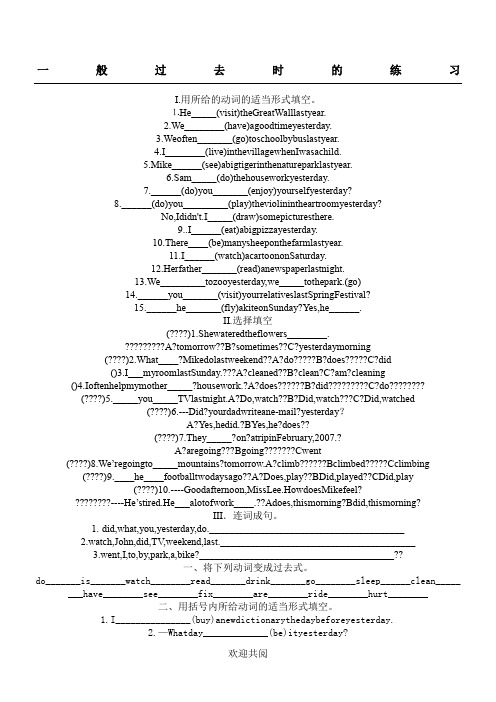
一般过去时的练习I.用所给的动词的适当形式填空。
⒈He_____(visit)theGreatWalllastyear.2.We________(have)agoodtimeyesterday.3.Weoften_______(go)toschoolbybuslastyear.4.I________(live)inthevillagewhenIwasachild.5.Mike______(see)abigtigerinthenatureparklastyear.6.Sam_____(do)thehouseworkyesterday.II.?morning?Bdid,thismorning?III.连词成句。
1.did,what,you,yesterday,do._______________________________________2.watch,John,did,TV,weekend,last._______________________________________3.went,I,to,by,park,a,bike?_______________________________________??一、将下列动词变成过去式。
do_______is_______watch________read_______drink_______go________sleep______clean_____ ___have________see________fix________are________ride________hurt________二、用括号内所给动词的适当形式填空。
1.I_______________(buy)anewdictionarythedaybeforeyesterday.2.—Whatday_____________(be)ityesterday?—It______________(be)Friday.3.He______________(be)herehalfanhourago.4.Weoften____________(play)gameslastterm.5.She_____________(give)meabookamomentago.6.Thegirl___________(get)upveryearlythismorning.7.They____________(take)photosneartheriveranhourago.8.He_________ (notwatch)TVyesterdayevening.9.—Why_________(be)theboylateforschool?—Becausehe_________(be)ill.10.MrGreen_________(come)tovisitmelastnight.11.Theteacher_________(agree)toourideayesterday.她昨天晚上看电视了。
(完整)六年级一般过去时练习题参考答案
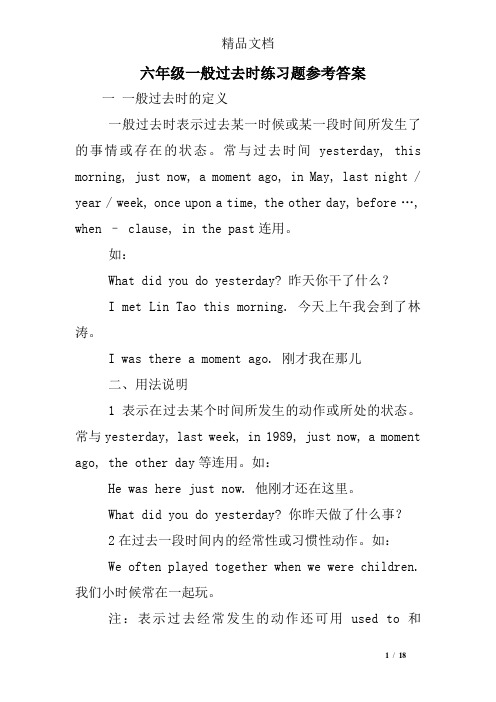
六年级一般过去时练习题参考答案一一般过去时的定义一般过去时表示过去某一时候或某一段时间所发生了的事情或存在的状态。
常与过去时间yesterday, this morning, just now, a moment ago, in May, last night / year / week, once upon a time, the other day, before …, when – clause, in the past连用。
如:What did you do yesterday? 昨天你干了什么?I met Lin Tao this morning. 今天上午我会到了林涛。
I was there a moment ago. 刚才我在那儿二、用法说明1表示在过去某个时间所发生的动作或所处的状态。
常与yesterday, last week, in 1989, just now, a moment ago, the other day等连用。
如:He was here just now. 他刚才还在这里。
What did you do yesterday? 你昨天做了什么事?2在过去一段时间内的经常性或习惯性动作。
如:We often played together when we were children. 我们小时候常在一起玩。
注:表示过去经常发生的动作还可用used to 和would。
如:He used to smoke a lot, but he doesn’t now. 他过去经常抽烟,但现在不抽了。
Whenever we were in trouble, he would help us. 每当我们遇到困难,他都会帮助我们。
3表示主语过去的特征或性格。
如:At that time she was very good at English. 那时她英语学得很好。
4用在状语从句中表示过去将来。
不规则动词过去式专项强化练习(试题)人教PEP版英语六年级下册

小升初不规则动词过去式专项强化练习班级学号姓名一、写出下列不规则动词的过去式1、(draw)2、(go)3、(do)4、(write)5、(buy)6、(take)7、(say)8、(send)9、(come) 10、(see) 11、(know) 12、(find) 13、(think) 14、(teach)15、(speak) 16、(eat) 17、(drink) 18、(wake)19、(leave) 20、(break) 21、(choose) 22、(sing)23、(draw) 24、(put) 25、(tell) 26、(lie)27、(bring) 28、(find) 29、(write) 30、(go)31、(do) 32、(say) 33、(send) 34、(come)35、(drink)二、单项选择题1. He to get very angry.A.begunB.beganC.beginned2. I my glasses when I fell.A.brokedB.brokenC.broke3. Those kids have five windows playing baseball.A.brokedB.brokenC.broke4. I have 11 studying French.A.begunC.beginned5. He told me that he had all the work himself.A.doneB.didC.done did6. Have you yet today?A.ateB.eatedC.eaten7.My father has me to talk to you.A.forbiddenB.forbadeC.forbid8.I him stealing that woman's purse.A.caughtB.catchedC.catch9. He must have 8 beers last night.A.drankB.drunkC.done drunk10. I down and broke my arm.A.fallenB.falledC.fell11. I a tire on the way to work.A.blownC.blow12. We have to the seaside resort many times.A.droveB.driveC.driven13. I haven't a bike in three years. (to ride)A.rodeB.riddenC.ride14. Someone has 10 books from the library.A.stolenB.stoleC.steal15. Godzilla up and began attacking the city.A.roseB.risedC.risen16. The song that she was very pretty.A. singsB. sungC. sang17. I have her many emails, but I've never received a response.A.writtenB.wroteC.write18. I 11 out those shoes long ago.A.woreB.worn19. He said that he two aspirins last night.A.takenB.tookC.has took20. My father across the lake.A. swumB. swimC. swam参考答案:一、Drew 、went、did、wrote、bought、took、said、sent 、came、saw 、knew、found 、thought 、taught、Spoke、ate 、drank、woke 、left、broke、chose、sang、Drew 、put 、Told、lay、brought 、found、wrote、went、did、said,drank。
译林版英语六年级上册一般过去时的归纳及练习

译林版英语六年级上册一般过去时的归纳及练习一般过去时1.一般过去时表示过去某个时间发生的动作或存在的状态,常和表示过去的时间状语连用。
一般过去时也表示过去经常或反复发生的动作。
2.Be动词在一般过去时中的变化:⑴am和is在一般过去时中变为was。
(was not=wasn't)⑵are在一般过去时中变为were。
(were not=weren't)⑶带有was或were的句子,其否定、疑问的变化和is, am, are一样,即否定句在was或were后加not,一般疑问句把was或were调到句首。
3.句中没有be动词的一般过去时的句子否定句:didn't +动词原形,如:Jim went home yesterday.Jim didn't go home yesterday.一般疑问句:在句首加did,句子中的动词过去式变回原形。
如:Jim went home yesterday.Did Jim go home yesterday?特殊疑问句:⑴疑问词+一般疑问句?如:Jim went home yesterday.Did Jim go home yesterday?What did Jim do yesterday?动词过去式变化规则:1.一般在动词末尾加-ed,如:pull-pulled, cook-cooked2.结尾是e加d,如:taste-tasted3.末尾是辅音字母加一个元音字母和一个辅音字母的重读闭音节,应双写末尾的辅音字母,再加-ed,如:stop-stopped4.以“辅音字母+y”结尾的,变y为i,再加-ed,如:study-studied5.不规则动词过去式:词义现在(原形)是am,是(be)是are (be)成为become开始begin弯曲bend吹blow买buy能can捕捉catch 选择choose 来come切cut做do, does 画draw饮drink过去waswere became beganbentblew bought could caught chosecame cut did drew drank 1吃感觉发现飞忘记得到给走成长有听受伤保持知道研究eatfeelfindfly forget getgivegogrow have, has hear hurt keep know learn atefelt found flewforgotgotgavewentgrewhadheardhurtkeptknewlearned,learnt允许,让letlet 躺lielay制造makemade可以maymight意味meanmeant会见meetmet必须mustmust放置putput读readread骑、乘riderode响、鸣ringrang跑runran说saysaid看见seesaw将shallshould唱歌singsang坐下sitsat睡觉sleepslept说speakspoke度过spendspent扫sweepswept2过去时练习写出下列动词的过去式是\am_____________飞___________找___________是___________吗have_____________ play___________ go______________ lose ________does_____________ dance__________ worry___________ ask ___________taste_____________ eat____________ take____________ see ____________bring____________ kick___________ go____________ do__________Be动词的过去时练习(1)一、用be动词的适当形式填空1.I _______ at school just now.2.He ________ at the camp last week.3.We ________ students two years ago.4.They ________ on the farm a moment ago.5.Yang Ling ________ eleven years old last year.6.There ________ an apple on the plate yesterday.7.There ________ some milk in the fridge on Sunday.8.The mobile phone _______ on the sofa yesterday evening.二、句型转换1. It was exciting.否定句:________________________________________________一般问题:______________________________________肯定回答:_______________________________________2. The students were very excited.否定句:________________________________________________ 一般疑问句:____________________________________________否:______________________________________3. The sweets were in his pocket.否定句:________________________________________________ 一般疑问句:____________________________________________否:______________________________________3Be动词的过去时练习(2)1.用be动词的适当形式填空1.I ______ an English teacher now.2.She _______ happy yesterday.3.They _______ glad to see each other last month.4.Helen and Nancy ________ good friends.5.The little dog _______ two years old this year.6.Look, there ________ lots of grapes here.7.There ________ a sign on the chair on Monday..8.Today _______ the second of June. Yesterday ______ the first of June. It _____ Children's Day.All the students ______ very excited.二、句型转换1. There was a car in front of the house just now.一般疑问句:____________________________________________肯定回答:__________________________________________否定回答:__________________________________________三、中译英1.我的故事书刚才还在手表旁边。
- 1、下载文档前请自行甄别文档内容的完整性,平台不提供额外的编辑、内容补充、找答案等附加服务。
- 2、"仅部分预览"的文档,不可在线预览部分如存在完整性等问题,可反馈申请退款(可完整预览的文档不适用该条件!)。
- 3、如文档侵犯您的权益,请联系客服反馈,我们会尽快为您处理(人工客服工作时间:9:00-18:30)。
过去式句子练习
一、按要求改写句子
is sunny today.(将today改为yesterday)
was a lion in the mountain .(改为一般疑问句)
was some bread on the table.(改为否定句)
took some photos just now.(改为一般疑问句)
went to the Great wall for the hoiday.(对划线部分提问) was at home yesterday.(改为一般疑问句)
used a mobile phone last year .(对划线部分提问)
was some bees in the flowers.(改为否定句)
二.根据中文翻译如下句子:
1.他上学不是坐公交车的。
2.我昨天抓住了一只猫。
3.我三岁的时候不会画画。
4.我妈妈昨天没有网购。
5.你昨天去钓鱼了吗?是的,我去的。
6.昨天妹妹给我看了她的新帽子。
7.昨天,我聪明的小弟弟指着公交车说:“我想去购物”。
8.你在假期去了哪里啊?
9.周末我去摘了橘子并钓了鱼。
上周的生日宴会邀请了我。
年前,我爸爸还是个小男孩。
12.我给了她一个苹果。
13.上海外滩很好玩。
14.我每天步行到学校。
15.昨天太热了,我待在家里看了动画片。
16.公园里有一场鹦鹉表演秀。
17.我们都喜欢那部电影。
18.我们一起去爬山好吗?
19.昨天,我在学校的午饭是自带的。
(午饭:lunch)
20. 在春天,公园里有很多蜜蜂吗?。
